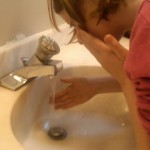Save Face
Despite my sensitive skin, I used to think buying a new face wash was a quick easy task. Until I had a particularly traumatic experience with a store-bought facial masque, that is: it resulted in a low-level chemical burn.

After that scare, standing amidst the sea of product ingredient labels became overwhelming. I realized I had no idea which ingredients were safe, or which could trigger such a severe reaction. What's a girl to do when there is no computer around to quickly check Skin Deep, the online cosmetics safety guide?
I did some research and found my answer with Smart Skin Care, a website that provides valuable instructions for reading skin care product labels. It also provides valuable information about what ingredients can be hazardous and should be avoided. According to the Fair Packaging and Labeling Act, all ingredients must be listed on the label. Generally, the ingredients are listed in descending order based on concentration. Smart Skin Care provides some valuable information to this, by explaining there are exceptions to this rule. For example, colors and fragrances are typically listed last, regardless of concentration. This is unsettling because, while some synthetic fragrances and colors may be safe, others may pose serious health risks to women. Synthetic fragrances have been linked to a wide spectrum of health complications, ranging in severity from cancer to slight skin irritation.
Scrutinizing labels can be tedious and time-consuming. I have decided to make a list of "absolutely not" ingredients to make faster decisions I don't second guess. Any tricks you want to share?
